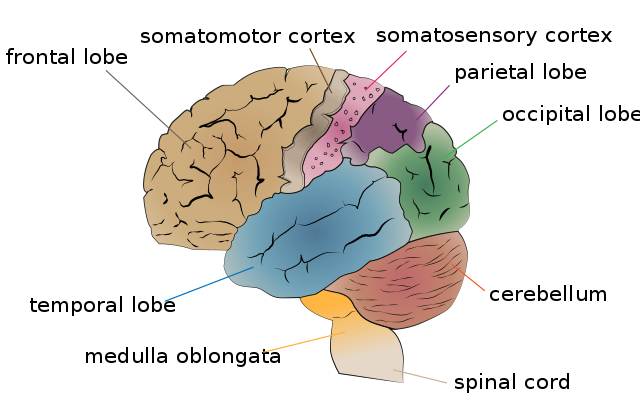In the last section, we established happiness as a mix of sensations that are strongly positive. Now we will discuss why this is essential to understanding human nature.
To do this we’ll proceed as follows:
- Why do we care about sensations?
- How can we talk about various types of sensations?
- Why is the Pursuit of Happiness is our core motivation?
Why do we care about sensations?
You live in your brain. It’s where all of your thoughts happen, its where all of your sensations go to. Sure, when you stub a toe you feel it in your toe, but that is actually an illusion. What happens is that pressure and pain sensors in your foot send electrical signals up your leg to your spine. The nerves in your spine go up brain stem then to the part of your brain called the thalamus. The thalamus then sends those signals to the somatosensory cortex which deals with incoming sensations from your limbs.

Why the detailed description of how you feel a stubbed toe? Because it’s amazing! But more to the current point, it shows that we are literally wired to feel sensations.
Everything we experience is a sensation: sight, sound, pain, pleasure, peace, guilt, etc. Some of the sensations are, by themselves, relatively benign. Seeing things doesn’t automatically make you feel something. Thinking doesn’t automatically make a person happy or sad, but there are a variety of sensations that are intrinsically positive or negative.
Motivating Sensations
I have categorized our motivating sensations. These categories shed important light on the role of sensations in our lives. In this table I list out the innate systems that people have and which work towards the practical good of the individual. There is so much to be said about this diagram, but the primary thing I hope you get from this is that everything we are motivated by is tired to the sensations we experience.
| Category | System(s) | Positive Sensation | Negative Sensation | Driver(s) | Naturally Promotes | Reasoning Mechanism |
|---|---|---|---|---|---|---|
| Physical | touch, taste, hearing, etc. | pleasure | pain | hunger, mortal fear, sexual desire, etc | reproduction and survival | classical conditioning |
| Emotional | emotions | positive emotions | negative emotions | wellbeing | general wellbeing | associative learning |
| Intellectual | thought, reason | comprehension, understanding | aporia, confusion | curiosity | truth | logic |
| Social | social emotions | belonging, purpose | isolation, purposelessness | sociality | finding meaningful place in society | social reasoning |
| Spiritual | conscience | inner peace | guilt, remorse | conscience | being right with the universe | morality |
| Aesthetics* | aesthetic sense | beauty, satisfaction | disgust, revulsion | creativity | environmental mastery | ? |
Sometimes people studying human nature focus no only a subset of the thing that drive us. For instance, some evolutionary biologists seek to reduce everything about human nature to the motivation for sex and survival. I hope that his chart has helped you understand the wholistic view of human endeavor I hope to capture in my definition of happiness and sadness.
There is a chance that you thought of a sensation that is not accounted for by something in this table. It could be that it is one of the value based sensations. That would be too much to cover in this article, but you can click here to learn more about those. If not, please share it in the comments below!
As mentioned in the previous section, our happiness is based on a mix of many different sensations. Now you have a much better idea of what those sensations consist of and why they are valuable ways to discuss human endeavors.
We are not innately motivated by survival or truth etc, but by the sensations that those things represent. Although those purposes can take on a purpose of their own as we will see in the discussion of desires.
The Pursuit of Happiness as Human Analysis
Everything that we have discussed so far are just potential things that a person could be motivated by. But, we know that not everyone is motivated by the same things. Some people don’t care about being super social and others don’t take the time to bring beauty into their worlds. Some people are artsy and some are very logical. Often they don’t overlap. With all of these variations in people’s likes and desires it becomes difficult to generalize about human motivation. That is why the universal of all humanity is the desire to be happy.
Within that desire is a near infinite variety of motivations, decisions, and applications. Everyone has their own version of what happiness means to them.
People seek to preserve and improve those things which contribute to their happiness and they seek to remove and lessen those things with contribute to their sadness.
That in a nutshell is the Pursuit of Happiness.
Everything else we discuss just an extension of this idea. With it we will explore the structure of societies, the day to day choices of individuals, morality, and ethics. It is the foundation of our study of religion and how we will come to understand the intricacies of great storytelling.

Leave a Reply